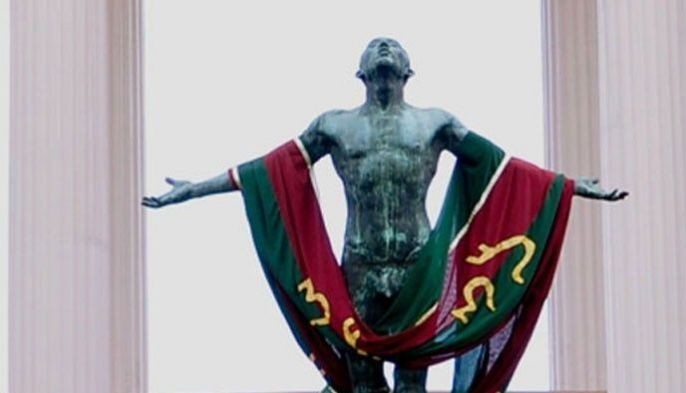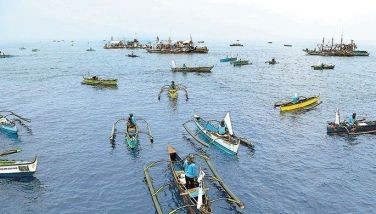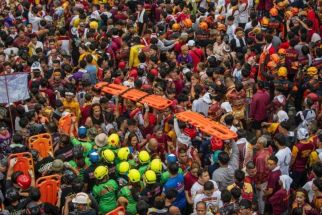DILG, PNP defend Asean meet expenses
June 20, 2006 | 12:00am
Officials of the Department of the Interior and Local Government (DILG) and the Philippine National Police (PNP) defended yesterday the procurement of vehicles, handguns and other equipment to be used during the 12th Association of Southeast Asian Nations (ASEAN) summit in Cebu in December.
Interior Secretary Ronaldo Puno said "there was nothing irregular nor extraordinary over the negotiated procurement of some P322 million worth of handguns, vehicles and other equipment for the PNP."
In fact, the PNP claimed that P56.2 million was saved on the purchases.
"The government saved some P400,000 and we have 204 patrol cars while as far as efficiency is concerned, the delivery of the equipment is assured," said Deputy Director General Avelino Razon Jr., chairman of the PNP’s bids and awards committee.
Chief Inspector Ermilando Villafuerte of the PNP legal service said the PNP purchased the handguns and vehicles at a lower price that was advantageous to the government.
For the caliber 9-mm. pistol, for example, the price accepted by the PNP was P19,400 per pistol for the Taurus PT92 from Brazil.
This resulted in a savings of P54 million because P151 million was earmarked for 5,000 pistols but the PNP paid only P97 million, he noted.
Before the award was made, the PNP Firearms and Explosives Division conducted a canvass of prices and found that the exclusive dealer of Berettas offered a price of P37,500 per pistol, while ARMSCOR offered its Tanfoglio at P26,000 per piece.
In the purchase of patrol cars, the PNP was able to increase the programmed quantity of 203 units to 204 units, yielding a savings of P400,061, Villafuerte noted.
For the 600-cc. motorcycles, the P650,000 unit price of Norkis Trading saved the PNP P1.8 million on the 12 units it purchased.
According to Puno, the procurement is among the programs bankrolled by the P1-billion supplemental budget released to the PNP by the Office of the President during its 20th anniversary last January.
Puno, who is also concurrent chairman of the National Police Commission (Napolcom), likewise pointed out that the equipment would not be used exclusively for the ASEAN summit to be held in December in Mandaue City.
"It would be distributed later to police stations nationwide to help augment the acute shortage of police vehicles and firearms. This would involve the procurement of 204 vehicles and 5,000 handguns for the PNP," said Puno.
He also clarified that "the procurement was not an emergency purchase."
The procurement process was undertaken over a period of three to four months of study to obtain the best possible deal for the PNP, Razon stressed.
He made assurances that the negotiated procurement "was in no way disadvantageous to the government, and even resulted in substantial savings for the police force."
"Because the PNP requires certain types of handguns that are available only from one supplier, it would not be feasible to undertake a public bidding for this type of procurement," Razon noted.
Puno recalled that when the PNP acquired lower-priced Beretta handguns through public bidding several years ago, the purchase turned out to be more expensive in the long run because the firearms had to be retooled later to fit the PNP’s specifications.
On the purchase of vehicles, Puno also noted that while the PNP may be able to get the cheapest patrol cars and motorcycles through public bidding, this would turn out to be more costly in the long term because the cheapest is not necessarily the best in terms of quality and availability of customer support and service.
"As chairman of the Napolcom, which has control and supervision over the PNP, I have gone over this negotiated procurement, and based on initial findings, found it to be in order," Puno declared.
However, Senate Minority Leader Aquilino Pimentel and Sen. Edgardo Angara warned top PNP officials could be held liable for violation of the Anti-Graft and Corrupt Practices Act (Republic Act 3019) and the E-Procurement Law.
They noted that government purchases without the benefit of bidding could be made to answer for this.
"Under the E-procurement law, that is not prohibited. That should undergo bidding," said Angara, author of the E-Procurement Law.
Angara said there is still time to bid for the new cars and firearms. The E-Procurement Law was enacted to eradicate all forms of corruption and red tape in government purchases.
Concerned PNP officials involved in the anomaly will have to "answer before the Ombudsman," Angara warned.
Pimentel shared his colleague’s stand, saying the PNP risks being charged criminally for violation of the Anti-Graft and Corruption Practices Act.
Both Pimentel and Angara said the plan should undergo the bidding process, despite the "urgency" to increase the PNP’s capability by first week of December to secure heads of states and other dignitaries who will attend the summit.
Already some 50 marked PNP vehicles — all brand new — are being displayed at the Toyota branch located along Roxas Boulevard near the corner of President Diosdado Macapagal Avenue in Pasay City.
Pimentel said the decision to set aside public bidding in favor of "negotiated procurement" and "direct contracting" could not be justified by the PNP’s claim that there would be insufficient time to purchase the needed equipment if it went through a regular bidding process.
"They cannot use the excuse that they have no time to do it. They have time to do it. All they have to do is to make sure that the terms and conditions for the acquisition of the items are clear and transparent and the laws on public bidding are complied with," he said.
Pimentel said the PNP authorities could not use the alibi of lack of time because they should have been duly advised on the ASEAN summit schedule.
"Also, don’t tell me that if they are unable to acquire the items, they cannot provide security" for those attending the summit, the minority leader said.
"What the police can do is make do with what they have, mobilize the arms and the resources they have for that purpose. If they cannot do so, then they should ask that the summit be transferred elsewhere."
Pimentel also stressed that the PNP should set the example by enforcing the laws, including those that are meant to prevent irregularities in the disbursement of public funds and procurement of equipment and supplies.
"We cannot sacrifice what the law requires on the basis of the inability of the police authorities to comply with the law. The police should be the first to obey the law. Otherwise, we are faced with a police force that would show the world that their officers are above the law. And that is a terrible indictment on the kind of governance and civilization that we have in this country," he said.
Reports had it that some groups might be using the procurement to sow intrigue against PNP chief Director General Arturo Lomibao who is set to retire on July 5.
But Puno noted: "I don’t think that these are an affront to General Lomibao who has proven his competence and his integrity in his years of service here.
"Speaking for the Napolcom, we have nothing but the highest admiration for him… We will be the first ones to affirm the integrity, the judiciousness and the quality of leadership of our Chief PNP," he added. — With Christina Mendez
Interior Secretary Ronaldo Puno said "there was nothing irregular nor extraordinary over the negotiated procurement of some P322 million worth of handguns, vehicles and other equipment for the PNP."
In fact, the PNP claimed that P56.2 million was saved on the purchases.
"The government saved some P400,000 and we have 204 patrol cars while as far as efficiency is concerned, the delivery of the equipment is assured," said Deputy Director General Avelino Razon Jr., chairman of the PNP’s bids and awards committee.
Chief Inspector Ermilando Villafuerte of the PNP legal service said the PNP purchased the handguns and vehicles at a lower price that was advantageous to the government.
For the caliber 9-mm. pistol, for example, the price accepted by the PNP was P19,400 per pistol for the Taurus PT92 from Brazil.
This resulted in a savings of P54 million because P151 million was earmarked for 5,000 pistols but the PNP paid only P97 million, he noted.
Before the award was made, the PNP Firearms and Explosives Division conducted a canvass of prices and found that the exclusive dealer of Berettas offered a price of P37,500 per pistol, while ARMSCOR offered its Tanfoglio at P26,000 per piece.
In the purchase of patrol cars, the PNP was able to increase the programmed quantity of 203 units to 204 units, yielding a savings of P400,061, Villafuerte noted.
For the 600-cc. motorcycles, the P650,000 unit price of Norkis Trading saved the PNP P1.8 million on the 12 units it purchased.
According to Puno, the procurement is among the programs bankrolled by the P1-billion supplemental budget released to the PNP by the Office of the President during its 20th anniversary last January.
Puno, who is also concurrent chairman of the National Police Commission (Napolcom), likewise pointed out that the equipment would not be used exclusively for the ASEAN summit to be held in December in Mandaue City.
"It would be distributed later to police stations nationwide to help augment the acute shortage of police vehicles and firearms. This would involve the procurement of 204 vehicles and 5,000 handguns for the PNP," said Puno.
He also clarified that "the procurement was not an emergency purchase."
The procurement process was undertaken over a period of three to four months of study to obtain the best possible deal for the PNP, Razon stressed.
He made assurances that the negotiated procurement "was in no way disadvantageous to the government, and even resulted in substantial savings for the police force."
"Because the PNP requires certain types of handguns that are available only from one supplier, it would not be feasible to undertake a public bidding for this type of procurement," Razon noted.
Puno recalled that when the PNP acquired lower-priced Beretta handguns through public bidding several years ago, the purchase turned out to be more expensive in the long run because the firearms had to be retooled later to fit the PNP’s specifications.
On the purchase of vehicles, Puno also noted that while the PNP may be able to get the cheapest patrol cars and motorcycles through public bidding, this would turn out to be more costly in the long term because the cheapest is not necessarily the best in terms of quality and availability of customer support and service.
"As chairman of the Napolcom, which has control and supervision over the PNP, I have gone over this negotiated procurement, and based on initial findings, found it to be in order," Puno declared.
However, Senate Minority Leader Aquilino Pimentel and Sen. Edgardo Angara warned top PNP officials could be held liable for violation of the Anti-Graft and Corrupt Practices Act (Republic Act 3019) and the E-Procurement Law.
They noted that government purchases without the benefit of bidding could be made to answer for this.
"Under the E-procurement law, that is not prohibited. That should undergo bidding," said Angara, author of the E-Procurement Law.
Angara said there is still time to bid for the new cars and firearms. The E-Procurement Law was enacted to eradicate all forms of corruption and red tape in government purchases.
Concerned PNP officials involved in the anomaly will have to "answer before the Ombudsman," Angara warned.
Pimentel shared his colleague’s stand, saying the PNP risks being charged criminally for violation of the Anti-Graft and Corruption Practices Act.
Already some 50 marked PNP vehicles — all brand new — are being displayed at the Toyota branch located along Roxas Boulevard near the corner of President Diosdado Macapagal Avenue in Pasay City.
Pimentel said the decision to set aside public bidding in favor of "negotiated procurement" and "direct contracting" could not be justified by the PNP’s claim that there would be insufficient time to purchase the needed equipment if it went through a regular bidding process.
"They cannot use the excuse that they have no time to do it. They have time to do it. All they have to do is to make sure that the terms and conditions for the acquisition of the items are clear and transparent and the laws on public bidding are complied with," he said.
Pimentel said the PNP authorities could not use the alibi of lack of time because they should have been duly advised on the ASEAN summit schedule.
"Also, don’t tell me that if they are unable to acquire the items, they cannot provide security" for those attending the summit, the minority leader said.
"What the police can do is make do with what they have, mobilize the arms and the resources they have for that purpose. If they cannot do so, then they should ask that the summit be transferred elsewhere."
Pimentel also stressed that the PNP should set the example by enforcing the laws, including those that are meant to prevent irregularities in the disbursement of public funds and procurement of equipment and supplies.
"We cannot sacrifice what the law requires on the basis of the inability of the police authorities to comply with the law. The police should be the first to obey the law. Otherwise, we are faced with a police force that would show the world that their officers are above the law. And that is a terrible indictment on the kind of governance and civilization that we have in this country," he said.
Reports had it that some groups might be using the procurement to sow intrigue against PNP chief Director General Arturo Lomibao who is set to retire on July 5.
But Puno noted: "I don’t think that these are an affront to General Lomibao who has proven his competence and his integrity in his years of service here.
"Speaking for the Napolcom, we have nothing but the highest admiration for him… We will be the first ones to affirm the integrity, the judiciousness and the quality of leadership of our Chief PNP," he added. — With Christina Mendez
BrandSpace Articles
<
>
- Latest
- Trending
Trending
Latest
Trending
Latest
Recommended





























